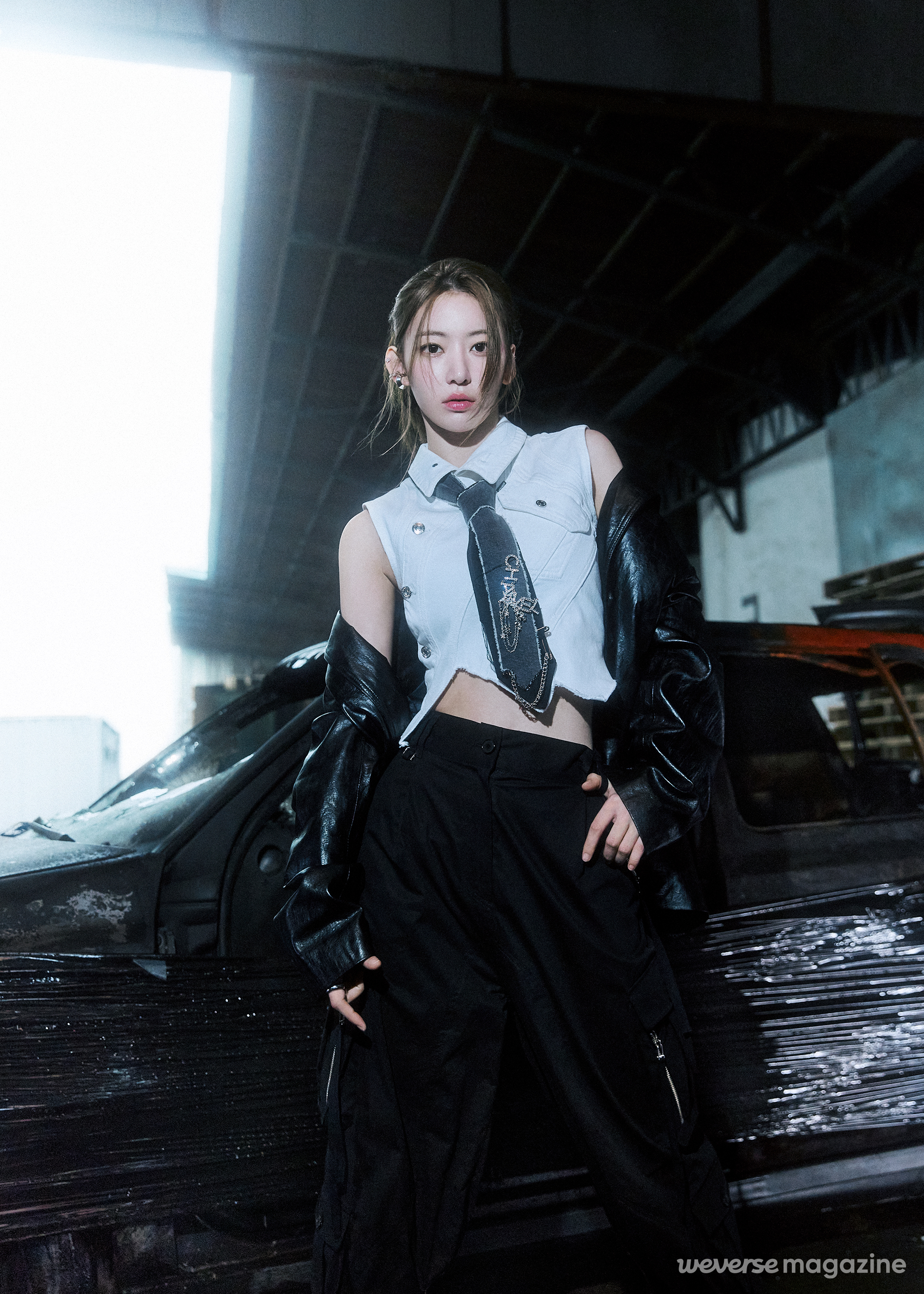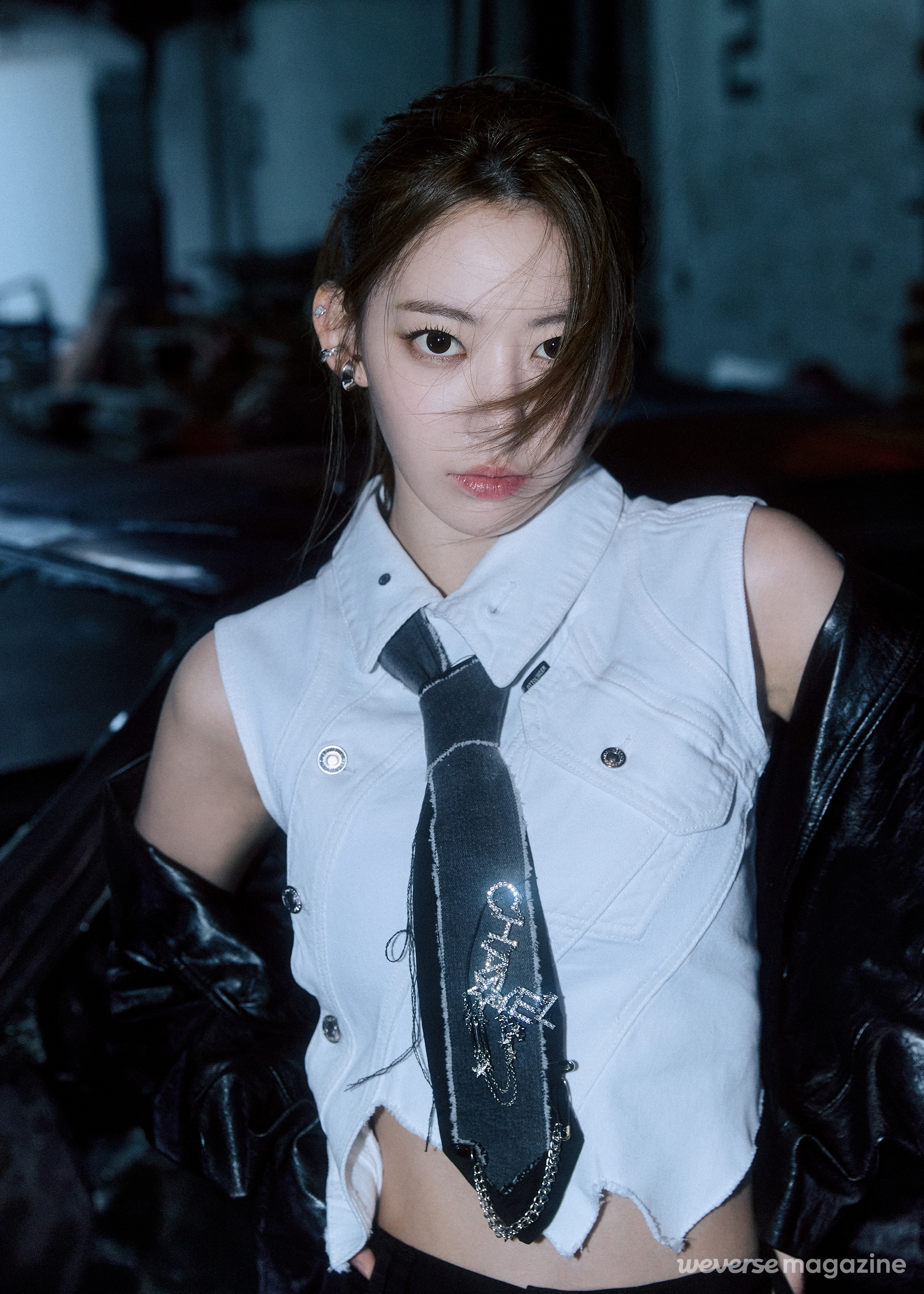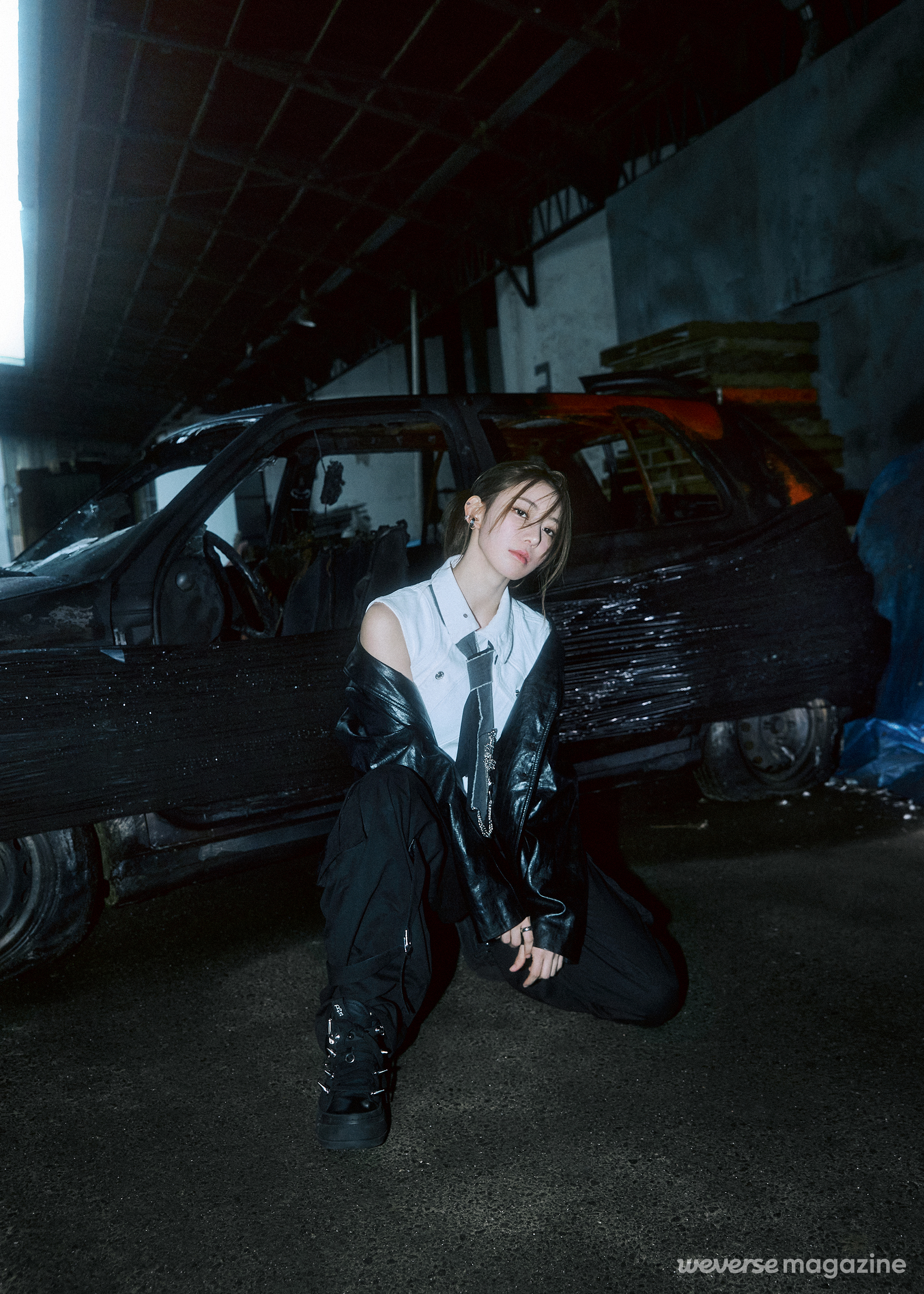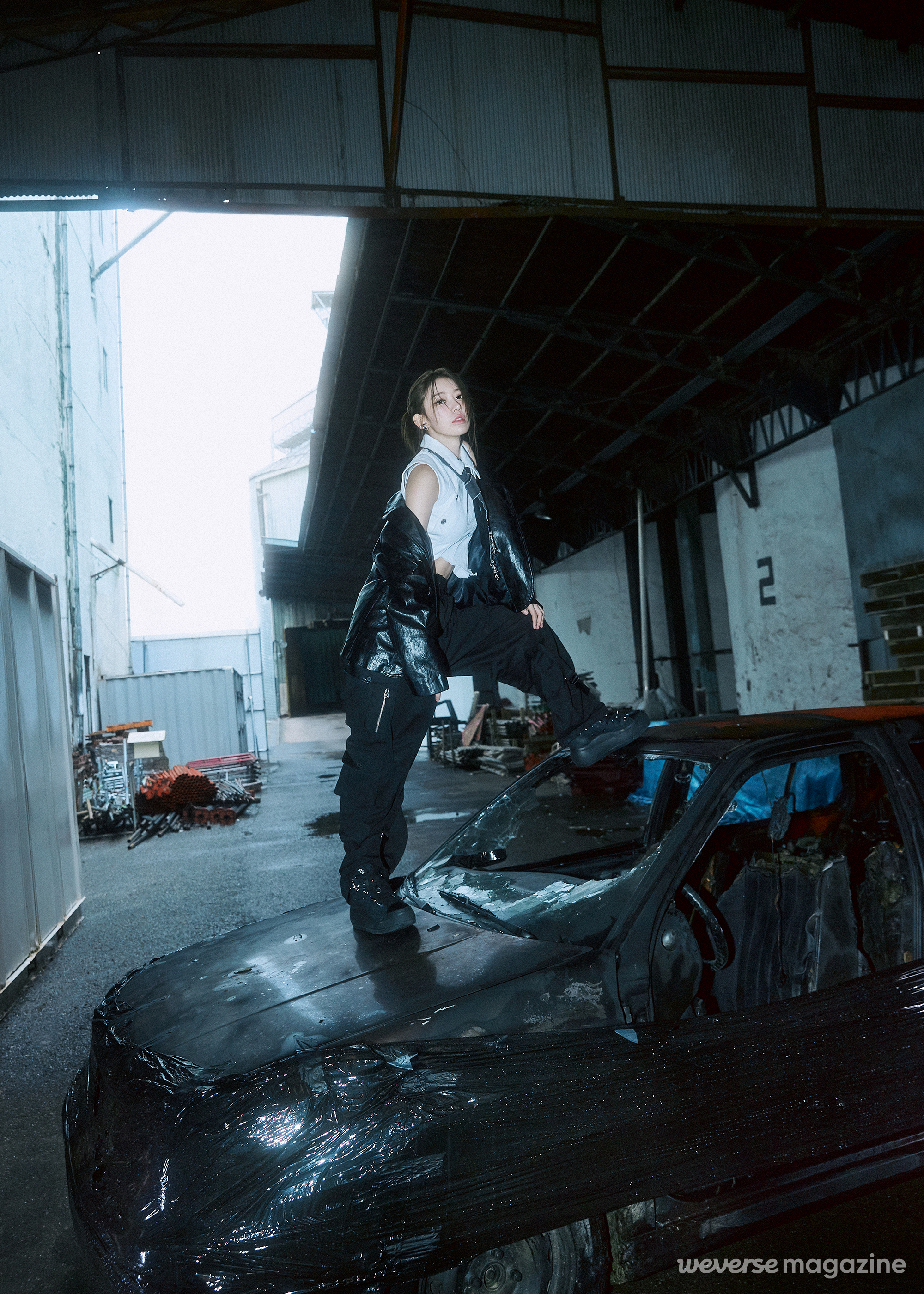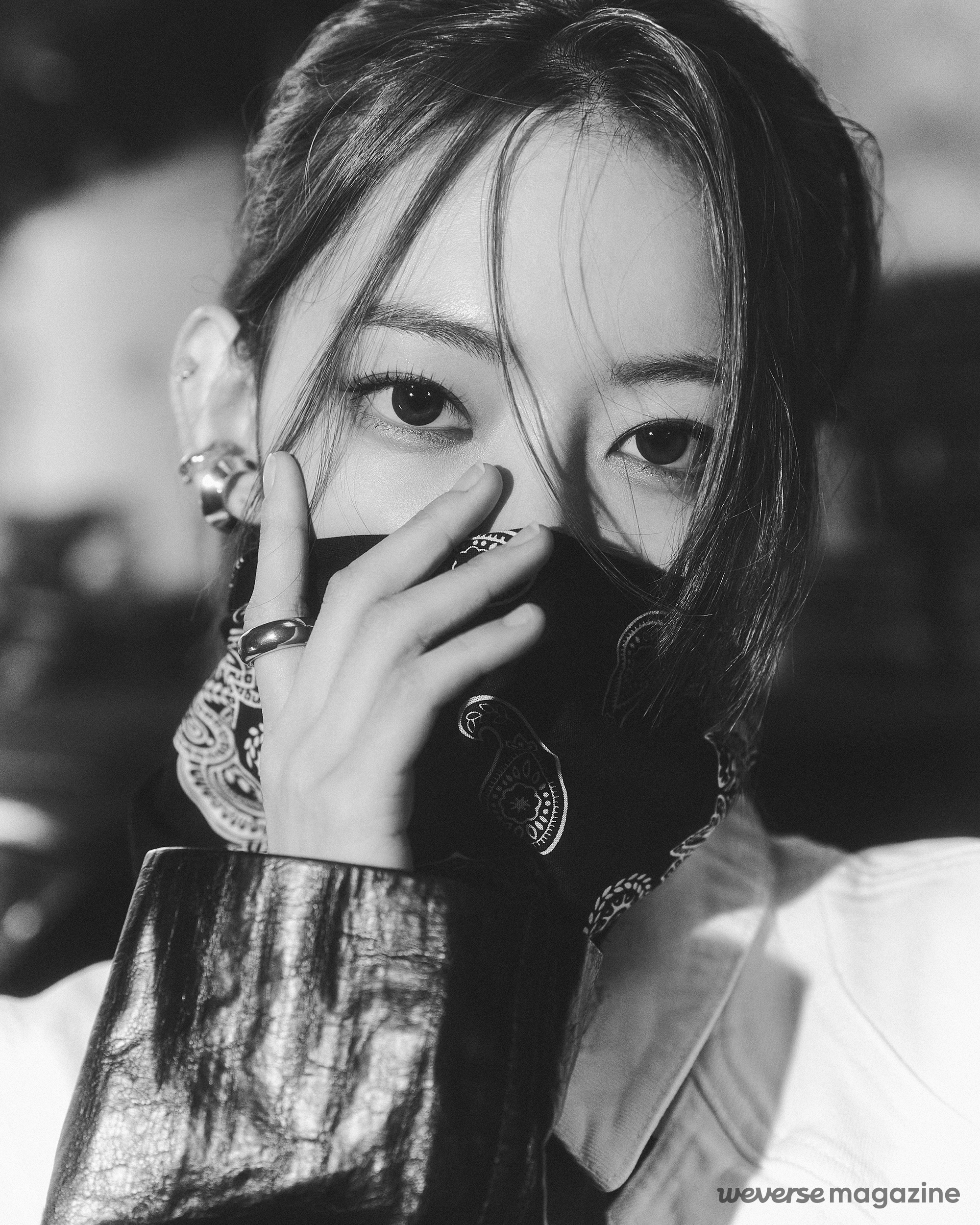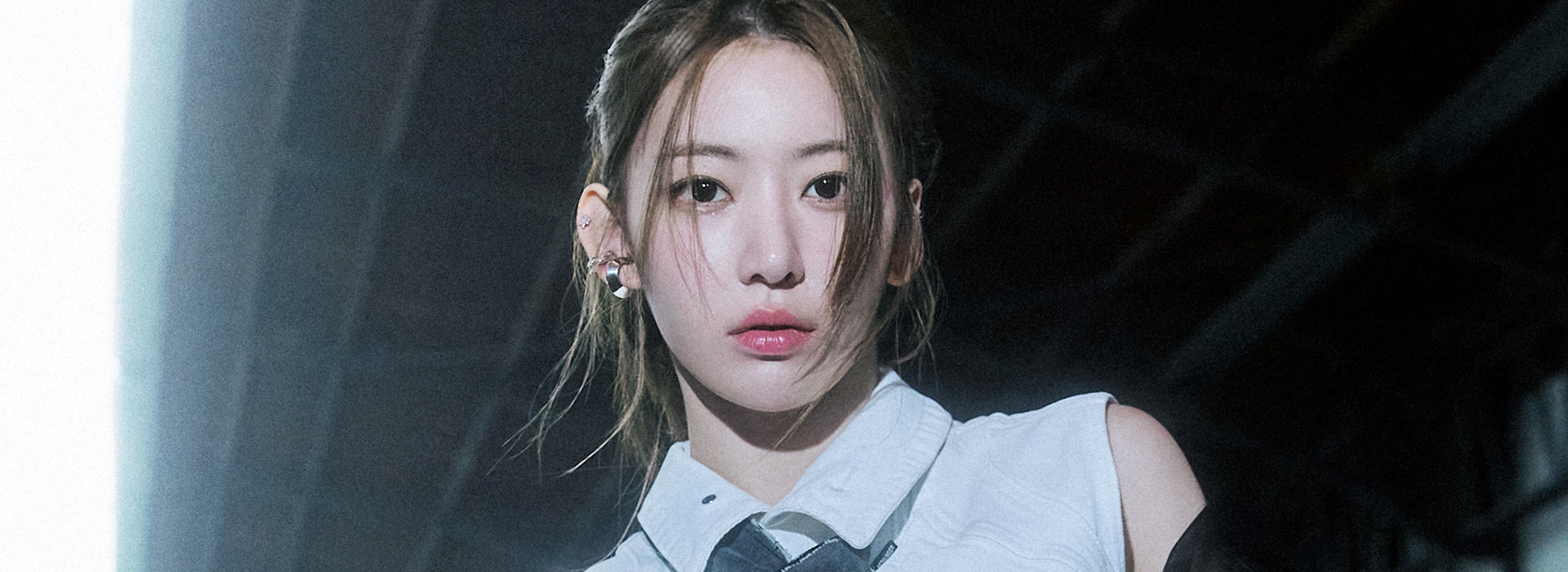
Sakura Miyawaki, born March 19, 1998. She’s made her idol debut three times over the span of 11 years, but she’s found the group for her—for good.
I saw you were reading a book in Korean even though you were busy with the photoshoot for the magazine.
SAKURA: I tried to make sure I read at least one book a month when I was in Japan. I wanted to read Korean books, too, but I thought it would be too difficult so I never bothered trying. But I surprised myself when I found out I can read Korean books better than I thought. (laughs) It’s not quite as easy as reading Japanese, and it takes me a little while to look up things I don’t know, but I read about two thirds of it.
I thought that book might be something you could sympathize with since it takes an honest look at the challenges and concerns that the actor faces as part of the entertainment industry.
SAKURA: I sympathized a lot with it. The author wanted to be honest about herself but she was worried she couldn’t be an actor if people found out how old she was or her marital status. The image that idols present of themselves is important, too. I want to be in this line of work for as long as I can be, but it could be difficult to keep it up for the rest of my life. And I’m slowly getting older. I think there’s a universal sense of anxiety among many people.
You were honest about the anxiety and worry you had experienced preparing for your debut in The World Is My Oyster documentary.
SAKURA: I feel better now that it’s been released. (laughs) I’ve always said what’s on my mind but I was particularly honest in the documentary. There’s so many great things about being an idol, but naturally it comes with its share of difficulties. I didn’t think it would be right to hide those parts on purpose. Everybody has their own problems, right? I think seeing how I overcome them might be new to some people. I want to be someone who others can look at and think about how idols are just regular people with their own concerns and who do their best to live a good life.
When you were on Knowing Bros, you told a story where you saw your birth father during a handshake event. Do you think the fact that you told that story is a reflection of that mindset?
SAKURA: It wasn’t a big secret or anything. I didn’t think when the right time to reveal it would be or anything like that. I just never said anything because it never came up. It wasn’t a big deal, so I just said that “something interesting happened to me.” But so many people thought it was such an awful story so I wondered if I just shouldn’t have said anything. (laughs) That was the first time I ever wondered if I have a hard life. I’m thankful to my biological father, of course, but I’m really grateful for the father who raised me. He raised me like I was his own biological daughter and supported me in every possible way in my life as an idol—sometimes even more than my mom. So I’ve had a happy life. I don’t want FEARNOT to worry about it at all.
So you were always open to being honest—you just never had the chance to be, maybe. LE SSERAFIM must be very meaningful to you, then. The group sings songs about your own lives and you’re completely genuine when you appear on variety shows. You even say, “Life is content!”
SAKURA: Even we don’t know how that got started. (laughs) It’s amazing how open all the members are and how close we’ve become. Before we debuted, we said, “There’s no way we can do variety shows.” Because we thought we’re so lame. (laughs) But after we did a few of them, we found out we’re pretty fun on video, and FEARNOT thought so, too. I think it’s probably because we’re out there enjoying every single moment of it. We all have the mindset that, if we’re going to do it, we should do it right and have fun with it. Even when we’re having a hard time, we say, “We have to get through this to be LE SSERAFIM!” Or, “We really are FEARLESS. We really are ANTIFRAGILE.” (laughs)
I think it’s that kind of attitude that lets you work together as well as you do. Even with the unexpected start of the music at the AKARAKA festival at Yonsei University, people couldn’t stop talking about how tight the group’s choreography was.
SAKURA: I always wanted to be a part of that kind of group—one where they’re incredibly precise dancing on stage, then they come down and show they’re just like everyone else. And what I’m hearing about LE SSERAFIM these days is, “I like their performances”; “they have a great group dynamic”; “their relationship is fantastic.” These days, I love working, and I’m more excited for this comeback than anybody else.
You’ve also personally undergone an incredible amount of growth, especially the way you adjust the tension in your body and move around to match the mood of “Impurities.” Are you perhaps now doing more than just growing and finding your own personal style as well?
SAKURA: I’m definitely on a different level lately. When we were doing FEARLESS, I was focused on showing improvement, but with this album I’m slowly finding out what I’m kind of good at and what makes me look best when I’m dancing. There’s lots of parts in “Impurities” where we have to show off our skills one by one. So after we would finish group practice, I would stay behind in the practice studio and do more on my own, which was really important to me. I still feel some pressure about singing, but the producer recently said to me, “Now when you sing, I can hear your own style in there.” It felt so good hearing my own voice for real when we performed at AKARAKA. I didn’t feel confident when I sang before, but now I think I should just give it a try, even if I make a mistake, because it’ll let me know what I’m capable of.
I think that’s exactly the kind of attitude this whole album required. Songs like “ANTIFRAGILE” and “No Celestial” have performances that require you to let go of your inhibitions and show everything you’ve got.
SAKURA: Exactly. The performance director told me, “Don’t try to act pretty—just enjoy the performance.” But the hardest thing for me is to ignore the camera and have fun. I’ve been an idol so long that, when the camera comes out, I automatically think about which way I should be looking and what to do, so I watched a lot of performances by foreign artists, like Olivia Rodrigo. They don’t pay any attention to the camera; they’re just natural. I tried thinking, This is my room and I’m going to have fun like nobody’s watching, and practicing that way, and it was fun. I watched in the mirror and saw expressions on my face that I never saw before. (laughs) It makes me worry if I’ll come across as unattractive, but it’s also exciting.
-
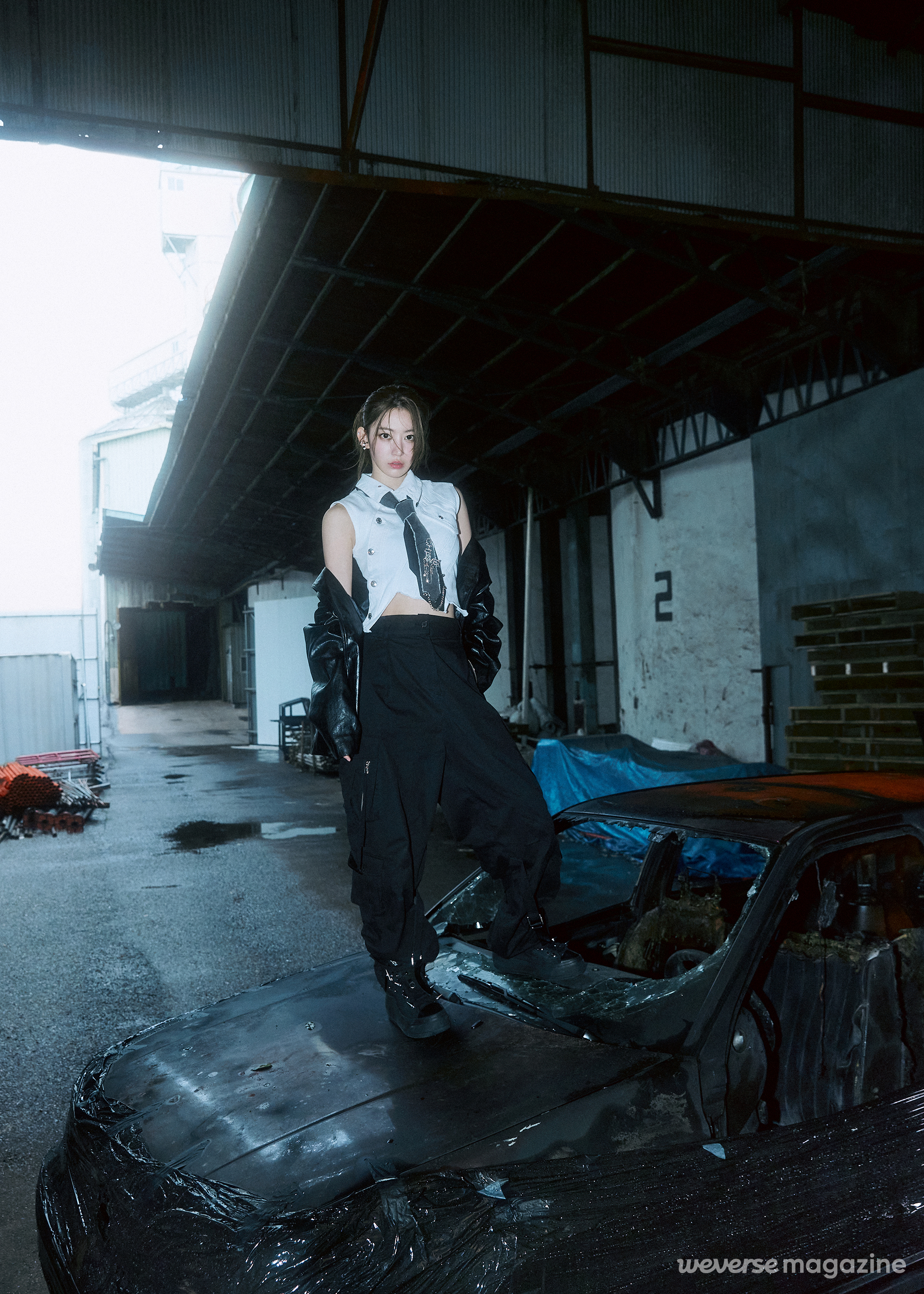 SAKURA’s outerwear by Diagonal, pants by GRACE ELWOOD, right ear cuff by SENSE OPTIC.
SAKURA’s outerwear by Diagonal, pants by GRACE ELWOOD, right ear cuff by SENSE OPTIC.
They say your personality naturally comes out through your movements when you dance. Did you learn anything new about yourself?
SAKURA: The performance director says the same thing all the time. (laughs) When you dance, your real personality comes out. When I dance, I usually feel like I need to understand why a move is the way it is. I’m the same way with most things. But it’s the feeling that’s important when you dance, and it’s something that’s hard to put into words. I need time to think about it by myself if I’m going to understand it.
You’re typically a very rational person. Do you think performing more emotionally charged songs like “ANTIFRAGILE” and “No Celestial” changed you a little bit?
SAKURA: Some of the members are good at having fun. YUNJIN and CHAEWON received a lot of positive feedback about their facial expressions in “ANTIFRAGILE,” which made me wonder if I should try having more fun, too. It’s made me a much happier person offstage, too, and now I talk a lot more when we’re making videos. (laughs) I used to tell myself I shouldn’t say certain things and that I had to look pretty when I laugh, but now I just keep it real.
That’s exactly what ANTIFRAGILE means: the seeming contradiction of becoming stronger and free despite exposing your flaws.
SAKURA: Of course people make mistakes and have things they can’t do very well. I’ve been in the industry a long time, so there’s times where I think, Ah, I wasn’t very good. I think accepting that is what being ANTIFRAGILE means to me. Nobody wants to have to look at their own mistakes. They’d rather just forget they ever happened. But even your mistakes are part of where you’re going and where you’ve been, so I think it’s better to acknowledge and embrace everything. It’s the smaller successes and failures that all come together to make who I am today.
That makes me think of some of the lyrics you wrote in “Good Parts (when the quality is bad but I am)”: “I just wanna love myself when I’m / Feeling good or feeling bad.”
SAKURA: Sometimes I see comments on the Internet where people judge an idol entirely based on one thing they do, and I always feel bad when I see how they get stressed out from that. When I see comments like that about me, I end up thinking, Did I always used to be that bad? Was I not any good back then? But, in reality, all those moments make up who I am. When I wrote the lyrics, I thought about how it would be nice if even just one person understood how I feel. It was something I wanted to say to the people who have a hard time loving themselves.
In the documentary, we see you telling YUNJIN before the debut, “I want to think I’m doing well, but even if I did I wouldn’t believe myself, right? It’s so difficult.” Maybe “Good Parts (when the quality is bad but I am)” could be the answer to that question.
SAKURA: I’m still going through that process. (laughs) “Good Parts (when the quality is bad but I am)” is about wanting to love yourself, not that you already fully do. There’s days when nothing works out no matter how hard you try and others when you feel terrible and have no idea why and you can’t do a single thing. But that’s still a part of who we are, so isn’t it better that we accept that and just try to do our best? Sometimes we absolutely hate ourselves, and other times we’re thrilled to be ourselves. I think the song goes over all those feelings.
It’s difficult for people to love themselves in this day and age. Social media and traditional media show us all these amazing images, but sometimes it doesn’t work out that way for you no matter how hard you try. How do you deal with that?
SAKURA: I heard something really helpful before debuting: that trying to succeed is like trying to set fire to a river. Which is basically impossible—setting a river on fire. And then they said, one day, when you least expect it, some gas comes down the river and when you try lighting the fire, that’s when something happens. So no matter how impossible it may seem, it’s the person who keeps trying to start a fire who eventually gets the timing right. So I think you need to be ready if you’re going to do what you want to achieve. I want to be an idol for a long time. You can get lucky and become successful in the short term, but holding onto that success for a long time is another story.
Maybe that mindset explains why sometimes what we see from you is so surprising. You usually can’t go on any of the rides at amusement parks and you hate scary things, but you fall back in the FEARLESS trailer like you have no fear.
SAKURA: I hate to be the person whose issues are bringing things down when there’s something we have to do, so if it’s something I can do if I just have a little courage, I’ll do it. Because I realized that it’s just scary to get started, and as soon as I do, it’s not as big a deal as I thought it was. Once that became a habit, I could do anything so long as it was related to idol work. But now I end up doing nothing on days where I don’t have any work to do. (laughs)
Since you have so much experience, you could ask them to adapt the shooting environment to suit you, but you adapt yourself to the environment instead.
SAKURA: I think I was immature, self-centered and only thinking of myself when I first debuted. But I learned there’s certain things you should say and do to be considerate of others and build a good relationship the longer I’ve been an idol. I think a celebrity’s abilities and talents are important, but even more important is what kind of person they are. If you’re going to work together for a long time and make it enjoyable, the people you’re working with have to want to work with you, too. That’s the kind of person I want to be, and that’s the kind of group I want LE SSERAFIM to be, too.
You seem to be very considerate of the people around you. During your staycation in DAYOFF, EUNCHAE wanted to play in the pool, and you told her, “Just do whatever you want! Do whatever, EUNCHAE. I’ll watch here.” You also told KAZUHA she was fine to speak in Japanese when she was startled by the bathroom light going out.
SAKURA: I want to make sure we all feel comfortable with each other. As you know, our group has something of an age gap. I try to tell the younger members to do what they want and I’ll watch because if they feel like they aren’t allowed to say and do the small things they want repeatedly, then I’m worried they won’t be able to speak up when it really matters. This way we have no problem talking to each other when there’s something really important to talk about or when someone feels hurt. Like, EUNCHAE is the youngest in the group and Zuha came from another country not that long ago. I think I’m trying to say to them the things I wanted to hear and appreciate them the way I wanted to be appreciated when I went through something similar. People were nice to me, but I’m trying to do the things that would’ve made me feel even better if they had.
You’re always paying attention to your surroundings. It seems like you’re also the planner and observer of the group. From the look of your videos, you really know how to put the other members’ strengths to good use and what roles to assign them.
SAKURA: I can just see it. I’m usually always off to the side watching, too. I talk to people when it seems like they’re not saying anything or notice they’re looking a little tired even when we’re practicing and there’s no camera around. I like taking pictures, so I had a film camera with me when we were shooting our most recent videos and took pictures of the other members, and I saw FEARNOT said they liked them because they really showed the members’ relationships with each other and each of their strong points. I really enjoy getting to know people through observation.
You wrote a letter to EUNCHAE where you said, “I’ll do all the difficult things for you so don’t you worry, just smile.” It’s not easy to want to do the hard things so that others can be happy. Has your idea of happiness moved from being about you to being about other people?
SAKURA: Now that I hear you say it, I think that’s true. That’s why I do all the things I do. I want to do things for others lately, and when I see them smiling, it makes me happy, too.
You posted a picture on Instagram of you in the practice studio and captioned it, “I’m just so happy.” What was making you so happy?
SAKURA: I want to be with the other members forever, but I know the day might come when we can no longer be together. Everything has to come to an end someday, and I’m only human, so I can’t keep performing on the stage forever. Who knows? I might even be going downhill already. So I have to cherish every single day. Even though this is the third time I’ve debuted, I don’t even notice the time passing because I get to spend every single day doing the things I love and looking forward to an even brighter future.
That reminds me of something in the book you’re reading: “When spring comes, it’s time to begin. That way, you can see it through to the end.”
SAKURA: I think the fact that nothing lasts forever makes every single moment that much more precious and sublime. I’ve been keeping a diary here and there for a long time, so I have a lot of old diaries filled up. When I look back on entries from a year ago trying to predict how I would feel in the future, my guesses always fell short of how amazing things are today. I’ve had happy moments I never could have expected and I’m so much happier with myself than I could have imagined. When you live every day to the fullest, it’s harder to remember everything that happens. That’s why I take pictures with my film camera and collect things and keep a diary. Because I don’t want to forget a single day.


Unauthorized reproduction and distribution prohibited.
